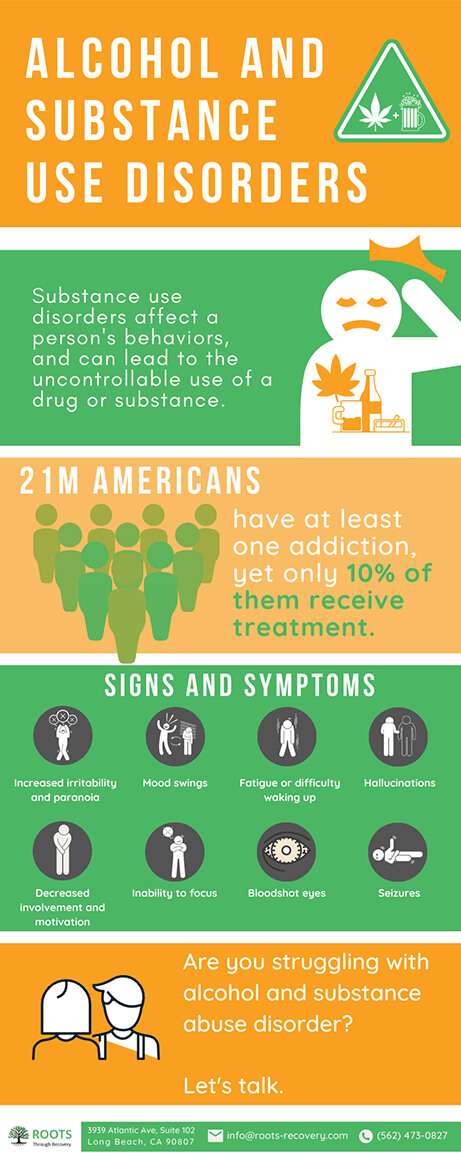
Alcohol & Substance Abuse Disorders | Substance Abuse Treatment
Alcohol and Substance Abuse isn’t uncommon, yet shame and embarrassment often keep people who are struggling in the shadows. All of us struggle in some way or another throughout our lives. Some of us turn to alcohol or drugs to mask trauma, pain, or as an escape. When we become dependent on substances to get through our day or week though, we can find ourselves losing control and the consequences can be devastating.
It’s normal to feel overwhelmed by the thought of seeking help, but it’s important to understand the process of making the decision to reach out. Many of the clients at Roots have learned that life can be very fulfilling and purposeful without alcohol or other substances–and you can too. Please read below to learn more about substance abuse and its outcomes. Additionally, we offer a prueba de evaluación gratuita que uno puede tomar.
¿Qué es?
The abuse of alcohol and drugs are influenced by a combination of biological, psychological, and environmental factors (such as genetics, history of mental illness, or other childhood trauma). Substance abuse can have an effect on a person’s overall quality of life. Potential effects include:
- Damage to organs, such as the heart, brain and liver
- Development of other mental illnesses
- Permanent changes to hormonal or nervous systems
- Damage to social relationships
- Financial issues
- Legal troubles
- Higher incidence of accidents and injury
- Loss of job or home stability
- Problems at school
- Suicidal behavior
- Risk of arrest and incarceration
What are the commonly abused drugs?
Substance abuse applies to both legal and illegal drugs as both can change how you function.
Alcohol
Heavy drinking can cause liver and other health problems as well as a more serious alcohol disorder.
Prescription and Over-the-Counter (OTC) Medicine
High doses of prescription medicine can make you feel drunk or intoxicated. Some examples include opioid pain relievers, anxiety medicine, and cough & cold medicine.
Heroin
This illegal drug gives you a rush of good feelings at first. But when it wears off, everything slows down and you may have chills, nausea, and nervousness.
Cocaine
This drug speeds up your whole body. Then, your mood may shift to anger and can cause you to do things that do not make sense.
Marijuana
While a growing number of states have legalized this drug for medical uses, in most states, it's still illegal. Heavy marijuana use can leave some people "burned out". Driving while high can be just as dangerous as drunk driving.
Meth
This drug is legal for treatment of certain disorders but it is most commonly used as a recreational drug. A meth intake can increase high levels of dopamine which can make you want to repeat the experience.
Synthetics
Synthetic drugs are illegally created to mimic other drugs and their effects on the users. Some examples include fentanyl, synthetic marijuana, synthetic stimulants, among others.
Opioids
This drug acts as pain relievers and gives you a feeling of euphoria which often causes its misuse. Heavy opioid use can cause addiction and other overdose incidents.
Benzos
This drug is most commonly prescribed by doctors in the US for anxiety, insomnia, and other conditions. Benzo gives you a relaxing feeling but can be dangerous and even lethal when abused.
¿Cuales son los signos y síntomas?
Cambios de comportamiento
Increased irritability, agitation, and paranoia
Trouble managing responsibilities at work, school, or home
Decreased involvement and motivation
Incapacidad para concentrarse
A lot of time spent seeking the substance or dealing with its aftereffects
Alucinaciones
Cambio en los hábitos de sueño
Fatigue or difficulty waking up
Cambios de humor
Marcas de inyección
Ojos inyectados en sangre
Convulsiones
Inability to stop using the substance even when the problems above are present
Preguntas frecuentes
Q: How should I approach a loved one who may be struggling with substance abuse?
A: It’s important to know the signs of substance abuse disorders and how to help them. But it’s also important to take care of yourself as well.
Q: How do I know if I am addicted?
A: If you have tried to stop using a substance, whether it be drugs or alcohol, and haven’t been able to do it on your own for an extended period of time, chances are you need professional help.
Q: What's the difference between abuse and addiction?
A: Drug abuse is described by the ongoing use of drugs despite continued problems in these and other areas caused by the drug abuse (including legal problems, physical harm or lack of action, and inability to manage responsibilities, all under the influence). Drug addiction, on the other hand, is described by the onset of withdrawal symptoms when without the drug of choice.
The connection between the two is that addiction doesn't start overnight.
Q: Is alcohol a drug?
A: Yes. It is classified as a depressant, meaning that it slows down vital functions—speech, movement, perceptions, and reactions. It’s a drug that reduces a person’s ability to think rationally and distorts one's judgement.
Da el primer paso ahora
Si necesita encontrar un lugar que le resulte cómodo y que le brinde apoyo, deje que los médicos clínicos y el equipo de gestión de casos experimentados de Roots Through Recovery trabajen con usted para determinar los próximos pasos a seguir. Queremos que tenga opciones que le brinden a usted y a sus seres queridos los mejores resultados.



